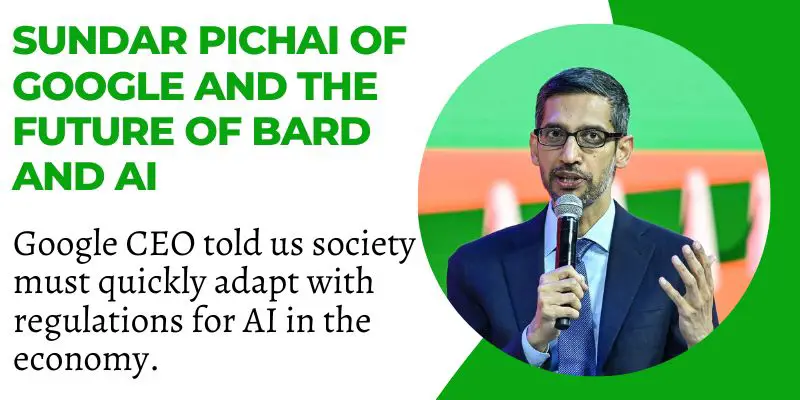In an interview with Sundar Pichai, the CEO of Google, various topics were discussed including Bard, the creative accomplishments of Google, the difficulties encountered such as hallucination, the automation of jobs, and the enigmatic nature of artificial intelligence.
As we move into the future, Artificial Intelligence (AI) is becoming more and more integrated into our lives. From smart home devices to autonomous vehicles, AI is transforming the way we live and work.
Google, one of the leaders in AI development, has been at the forefront of this technological revolution.
In a recent interview with 60 Minutes, Google’s CEO Sundar Pichai spoke about the future of AI and how it will change the world as we know it.
In this article, we will explore the key takeaways from the interview and discuss how AI is set to transform industries ranging from healthcare to education.
The Interview

During the interview, Pichai emphasized the importance of AI in solving some of the world’s biggest problems. He spoke about how AI is being used to develop more accurate models for climate change and to improve healthcare outcomes.
Pichai also discussed the challenges of developing AI ethically and responsibly.
One of the most significant takeaways from the interview was Pichai’s comments on the potential impact of AI on job markets.
While acknowledging that AI may replace some jobs, Pichai also highlighted the potential for AI to create new jobs and enhance human capabilities.
He emphasized the importance of investing in education and training to ensure that people are prepared for the changes that AI will bring.
AI in Healthcare
AI has the potential to revolutionize healthcare by enabling more accurate diagnoses, personalized treatment plans, and better patient outcomes.
Machine learning algorithms can analyze vast amounts of patient data to identify patterns and predict outcomes. This can help doctors to make more informed decisions and provide better care.

AI is also being used to develop new drugs and therapies. By analyzing large datasets, researchers can identify new targets for drug development and accelerate the discovery process. This has the potential to save lives and improve the quality of life for patients with chronic diseases.
AI in Education
AI is also set to transform the education industry. Machine learning algorithms can analyze student data to identify areas where individual students may be struggling and provide personalized recommendations for improvement.
This can help to improve academic outcomes and ensure that all students have the opportunity to reach their full potential.
AI can also be used to create more engaging and interactive learning experiences. Virtual reality simulations and chatbots can provide students with immersive experiences that help to reinforce learning and improve engagement.
Conclusion
As we move into the future, AI will continue to play an increasingly important role in our lives. From healthcare to education, AI has the potential to transform industries and create new opportunities.
While there are challenges associated with developing AI ethically and responsibly, it is clear that the benefits of AI are vast and far-reaching.
To stay ahead of the curve, it is important for individuals and organizations to invest in education and training to ensure that they are prepared for the changes that AI will bring.
By doing so, we can ensure that we are able to harness the power of AI to create a better future for all.
You can read the full interview on CBS
